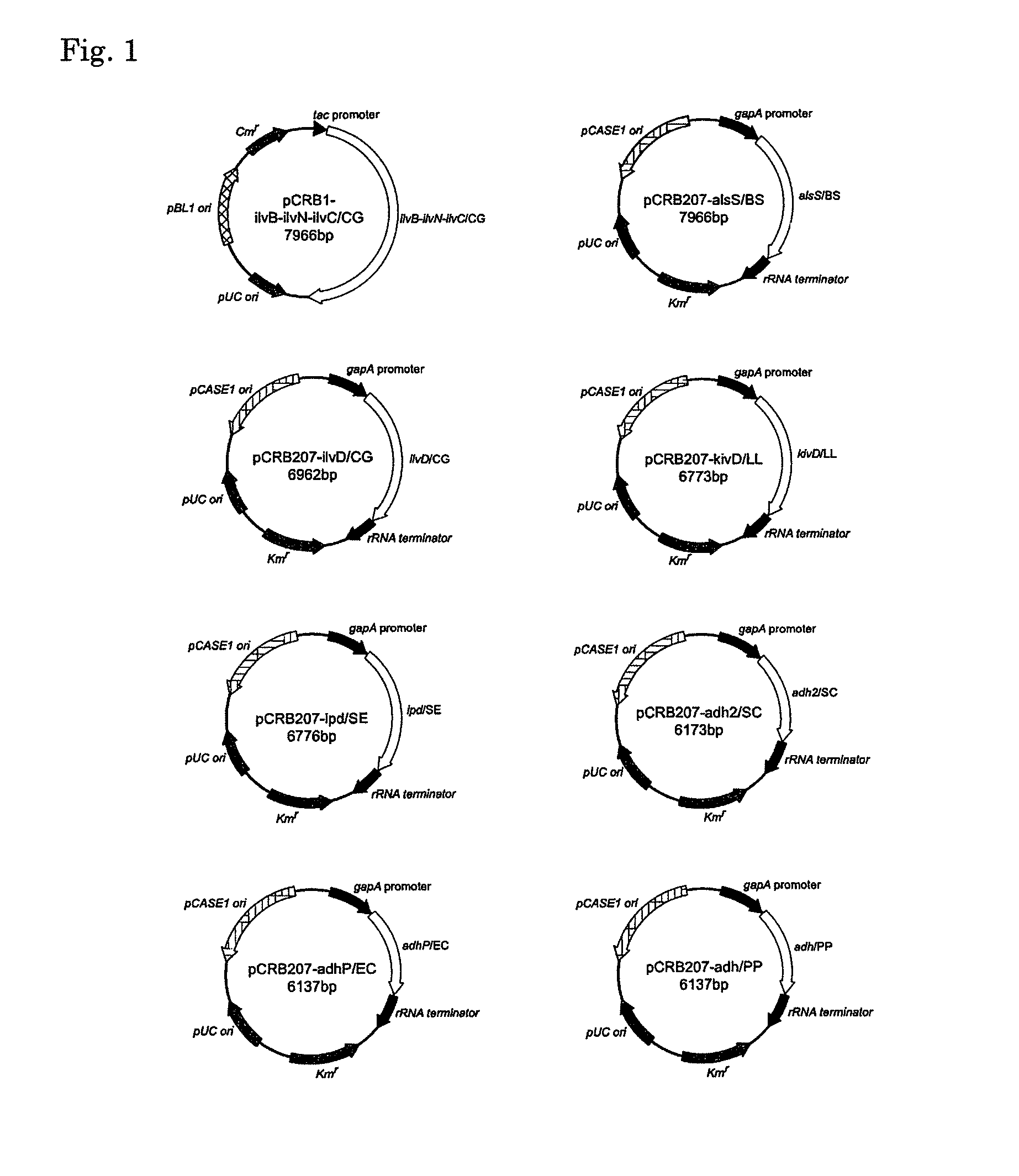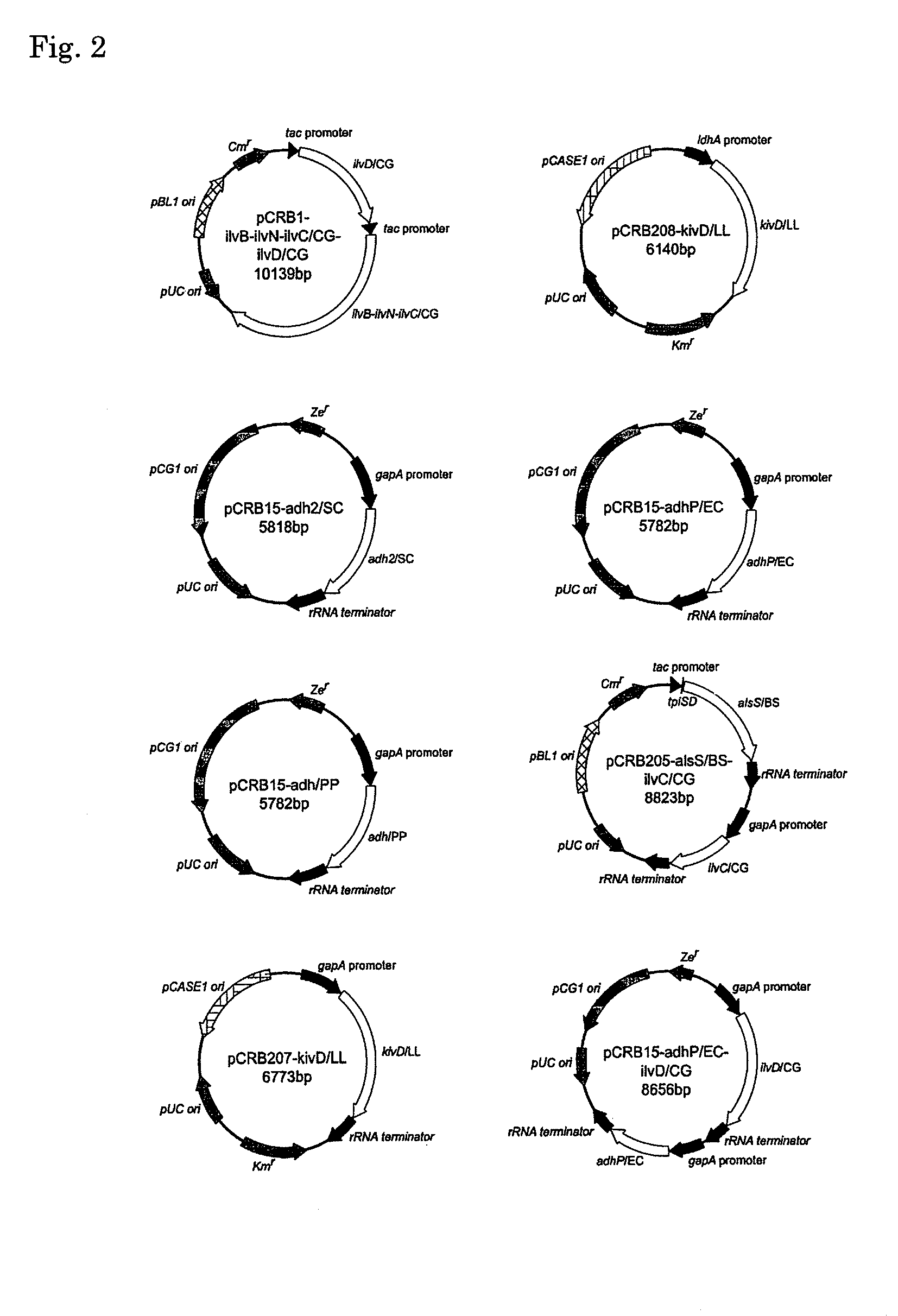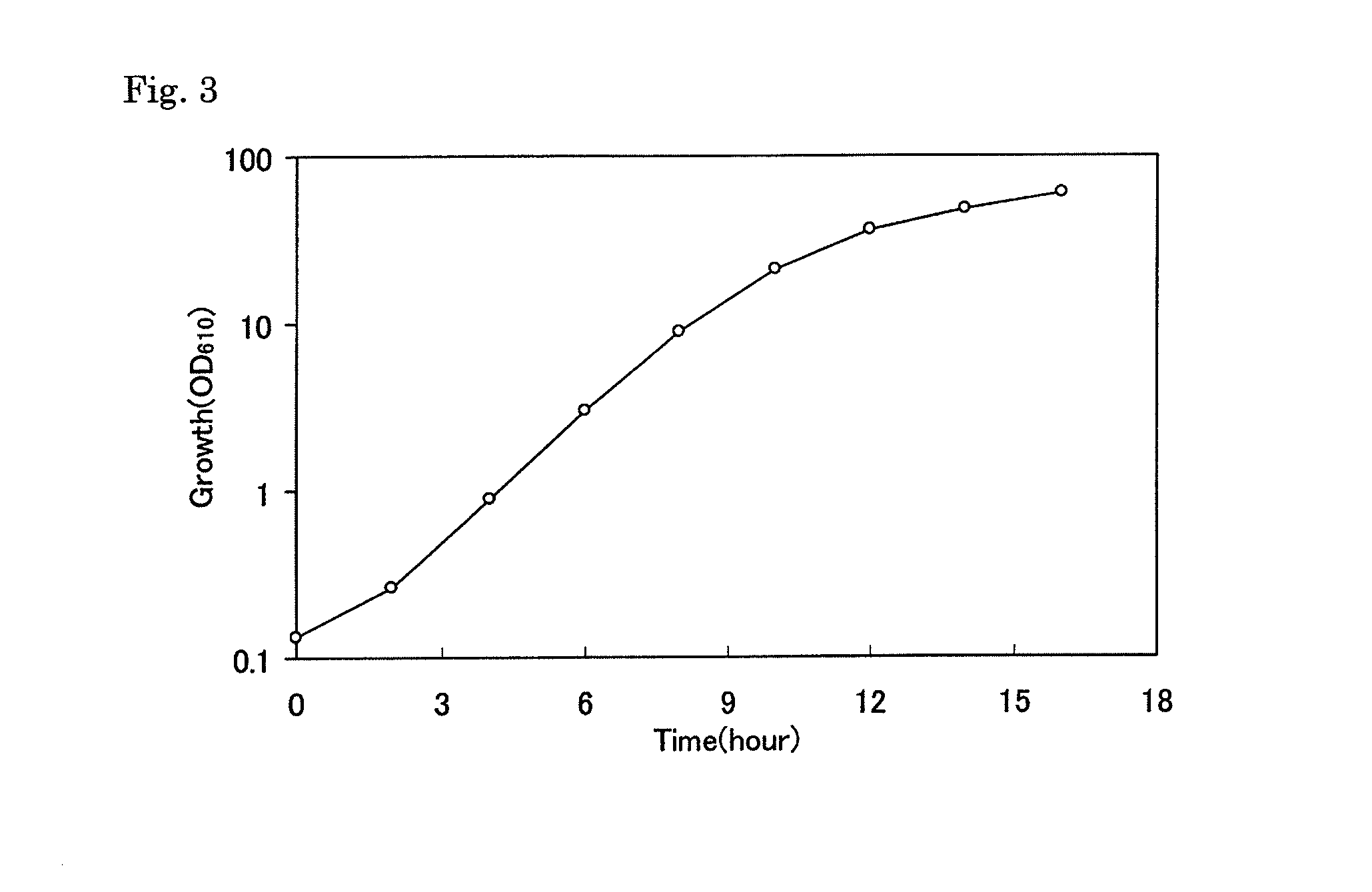Coryneform bacterium transformant and process for producing isobutanol using the same
a technology of coryneform bacteria and transformant, which is applied in the direction of lyse, enzymology, biofuels, etc., can solve the problems of inefficiency of isobutanol production, no teaching regarding the production of highly efficient isobutanol can be achieved without, and the literature does not include butanol producing technology, etc., to achieve the effect of high efficiency of isobutanol production, easy collection and purification, and remarkable efficiency
- Summary
- Abstract
- Description
- Claims
- Application Information
AI Technical Summary
Benefits of technology
Problems solved by technology
Method used
Image
Examples
example 1
Cloning and Expression of Isobutanol-Producing Genes
(1) Extraction of Chromosomal DNA from Microorganisms
[0130]To extract chromosomal DNA from Bacillus subtilis 168 NBRC14144, the bacterium was inoculated in NBRC Medium No. 802 (10 g of polypeptone, 2 g of yeast extract, and 1 g of MnSO4.7H2O were dissolved in 1 L of distilled water) with use of a platinum loop, and cultured with shaking at 37° C. until logarithmic growth phase. Then, according to the instruction manual, chromosomal DNA was recovered from the collected cells with use of a DNA extraction kit (trade name: GenomicPrep Cells and Tissue DNA Isolation Kit, made by Amersham).
[0131]To extract chromosomal DNA from Corynebacterium glutamicum R (FERN P-18976) and total DNA from Corynebacterium casei JCM12072, the bacterium was inoculated, with use of a platinum loop, in A Medium (2 g of (NH2)2CO3 7 g of (NH4)2SO4, 0.5 g of KH2PO4, 0.5 g of K2HPO4, 0.5 g of MgSO4.7H2O, 1 mL of 0.06% (w / v) Fe2SO4.7H2O+0.042% (w / v) MnSO4.2H2O, 1 ...
example 2
Enzyme Activity Measurement in Corynebacterium glutamicum to Which Isoisobutanol-Producing Gene has Introduced
[0329]The activity of isoisobutanol production-related enzymes, namely acetohydroxy acid synthase (AHAS), acetohydroxy acid isomeroreductase (AHAIR), dihydroxy acid dehydratase (DHAD), 2-keto acid decarboxylase (KDC), and alcohol dehydrogenase (ADH), in Corynebacterium glutamicum R ldhA mutant into which one of the isoisobutanol-producing genes constructed in Example 1 had been introduced (hereinafter referred to as Corynebacterium glutamicum single-gene transgenic strain) (however, ilvB, ilvN, and ilvC are ligated to each other on the same plasmid as a special case) was measured by the following methods. As a control, the Corynebacterium glutamicum R ldhA mutant used as a host was also measured for the activity in the similar way.
(1) Activity Measurement of AHAS, AHAIR, DHAD, and ADH
[0330]Corynebacterium glutamicum single-gene transgenic strain was applied to A agar medium ...
example 3
Creation of Corynebacterium glutamicum IBU1, IBU2, IBU3, IBU4, and IBU5
(1) Cloning of Butanol-Producing Genes Cloning of Isobutanol-Producing Gene Derived from Bacillus subtilis
[0353]A DNA fragment comprising the alsS gene which encodes acetohydroxy acid synthase derived from Bacillus subtilis was amplified by the PCR method as described below.
[0354]In the PCR, the following set of primers was synthesized based on the sequence from Bacillus subtilis (SEQ ID NO: 58 (the alsS gene)) with use of “394 DNA / RNA Synthesizer” made by Applied Biosystems for cloning of the alsS gene, and was used.
Primers for alsS Gene Amplification
[0355]
(SEQ ID NO: 59)(a-20):5′-CTCT CCCGGGAAACTTTTTAGAAAGGTGTGTTTCACCCGTGTTGACAAAAGCAACAAAAGAAC-3′(SEQ ID NO: 60)(b-20):5′-CTCT CCCGGG AGATCT CTAGAGAGCTTTCGTTTTCATGA-3′
[0356]Primer (a-20) has a SmaI restriction enzyme site added thereto, and primer (b-20) has SmaI and BglII restriction enzyme sites added thereto.
Cloning of Isobutanol-Producing Genes Derived from Cor...
PUM
| Property | Measurement | Unit |
|---|---|---|
| oxidation-reduction potential | aaaaa | aaaaa |
| temperature | aaaaa | aaaaa |
| culture temperature | aaaaa | aaaaa |
Abstract
Description
Claims
Application Information
 Login to View More
Login to View More - R&D
- Intellectual Property
- Life Sciences
- Materials
- Tech Scout
- Unparalleled Data Quality
- Higher Quality Content
- 60% Fewer Hallucinations
Browse by: Latest US Patents, China's latest patents, Technical Efficacy Thesaurus, Application Domain, Technology Topic, Popular Technical Reports.
© 2025 PatSnap. All rights reserved.Legal|Privacy policy|Modern Slavery Act Transparency Statement|Sitemap|About US| Contact US: help@patsnap.com



